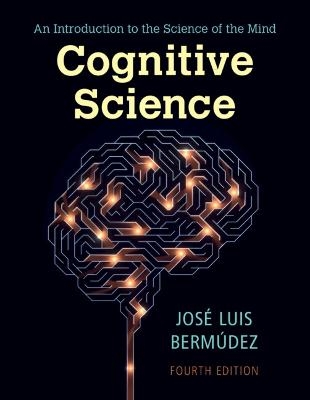
Cognitive Science
Cambridge University Press (Verlag)
978-1-009-07367-7 (ISBN)
The fourth edition of this popular text has been significantly rewritten to make it more accessible to students and easier for instructors to use. It remains distinctive in presenting a unified narrative of cognitive science as a field of inquiry in its own right. Thematically organized, Cognitive Science underscores the problems and solutions of cognitive science rather than more narrowly examining individually the subjects that contribute to it - psychology, neuroscience, linguistics, and so on. The generous use of examples, illustrations, and applications demonstrates how theory and experiment can be applied to unlock the mysteries of the human mind. Drawing upon cutting-edge research, the text has been updated and enhanced with a new chapter on emotions and the emerging field of affective science. An extensive online set of resources is available to aid both instructors and students.
José Luis Bermúdez's research interests are interdisciplinary in nature at the intersection of philosophy, psychology, and neuroscience. His many books include The Paradox of Self-Consciousness (MIT Press, 1998), which analyzes the nature of self-awareness; Thinking without Words (Oxford, 2003), which offers a model for thinking about the cognitive achievements and abilities of prelinguistic infants and nonlinguistic humans, and Decision Theory and Rationality (Oxford, 2009), which explores tensions in how the concept of rationality is defined and formalized in different academic disciplines. Recent books include Understanding “I”: Language and Thought, published by Oxford University Press in 2017 and The Bodily Self: Selected Essays by MIT Press in 2018. His most recent book, The Power of Frames (Cambridge, 2020) was supported by an ACLS fellowship for 2018-2019 and an NEH Summer Stipend for 2018. A target article with peer commentary based on The Power of Frames appeared in Behavioral and Brain Sciences (2022).
Preface; Introduction: the challenge of cognitive science; Part I. Historical Landmarks: 1. The prehistory of cognitive science; 2. The discipline matures: three milestones; 3. The turn to the brain; Part II. Models and Tools: 4. Physical symbol systems and the language of thought; 5. Neural networks and distributed information processing; 6. Applying dynamical systems theory to model the mind; 7. Bayesianism in cognitive science; 8. Modules and architectures; 9. Strategies for brain mapping; Part III. Applications: 10. Models of language learning; 11. Object perception and folk physics; 12. Machine learning: from expert systems to deep learning; 13. Exploring mindreading; 14. Robotics: from GOFAI to situated cognition and behavior-based robotics; 15. The cognitive science of consciousness; 16. The emotions: from cognitive science to affective science; 17. Looking ahead: challenges and opportunities; Glossary; References; Index.
| Erscheinungsdatum | 10.11.2022 |
|---|---|
| Zusatzinfo | Worked examples or Exercises |
| Verlagsort | Cambridge |
| Sprache | englisch |
| Maße | 217 x 279 mm |
| Gewicht | 1130 g |
| Themenwelt | Geisteswissenschaften ► Psychologie ► Allgemeine Psychologie |
| Geisteswissenschaften ► Psychologie ► Verhaltenstherapie | |
| ISBN-10 | 1-009-07367-2 / 1009073672 |
| ISBN-13 | 978-1-009-07367-7 / 9781009073677 |
| Zustand | Neuware |
| Informationen gemäß Produktsicherheitsverordnung (GPSR) | |
| Haben Sie eine Frage zum Produkt? |
aus dem Bereich


